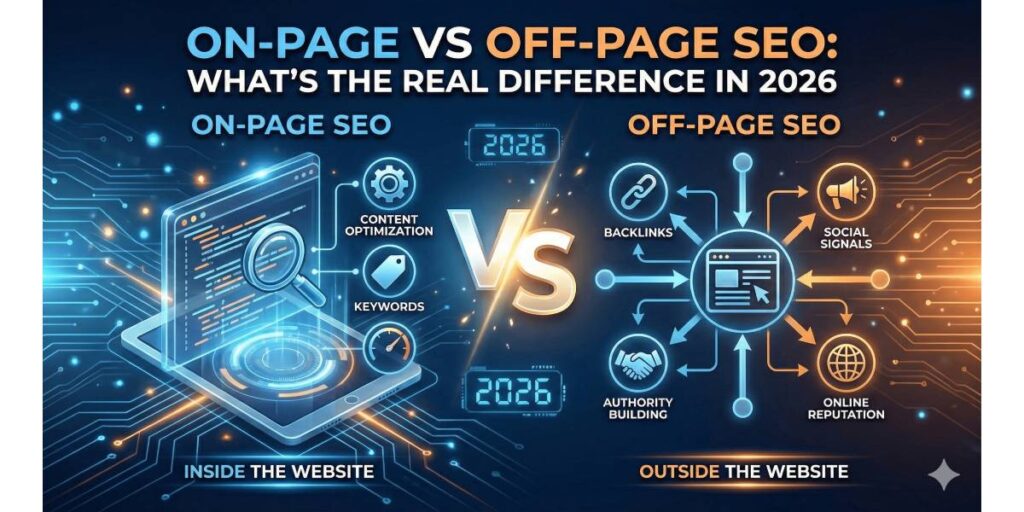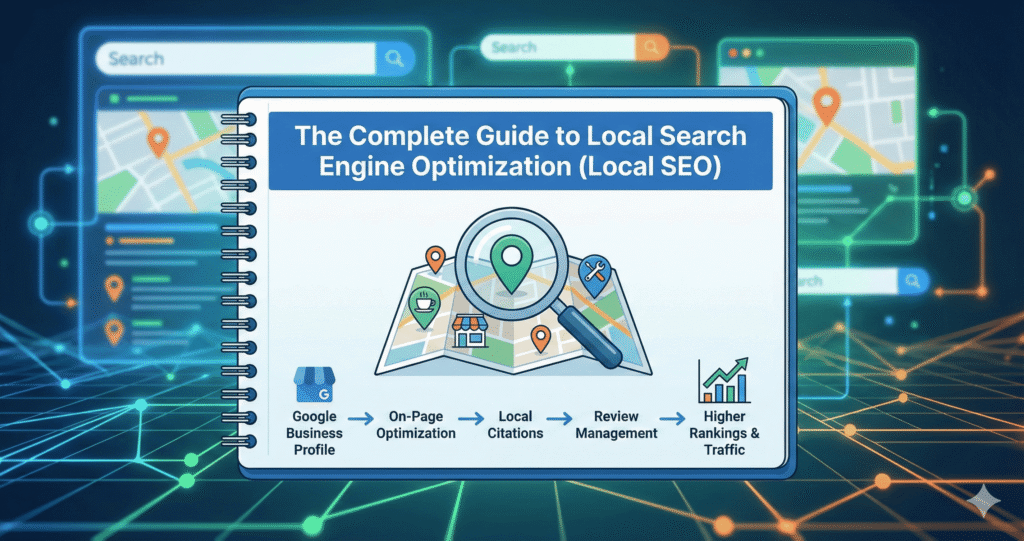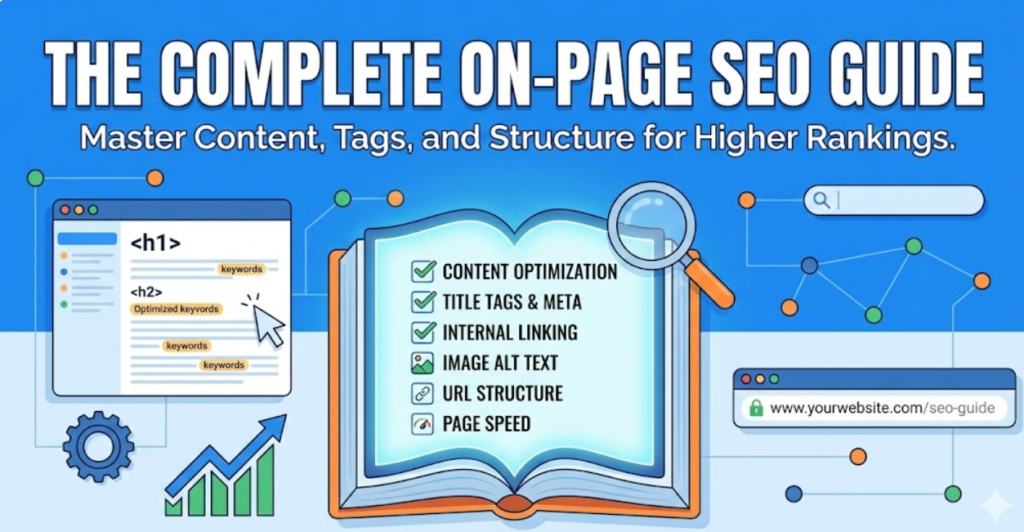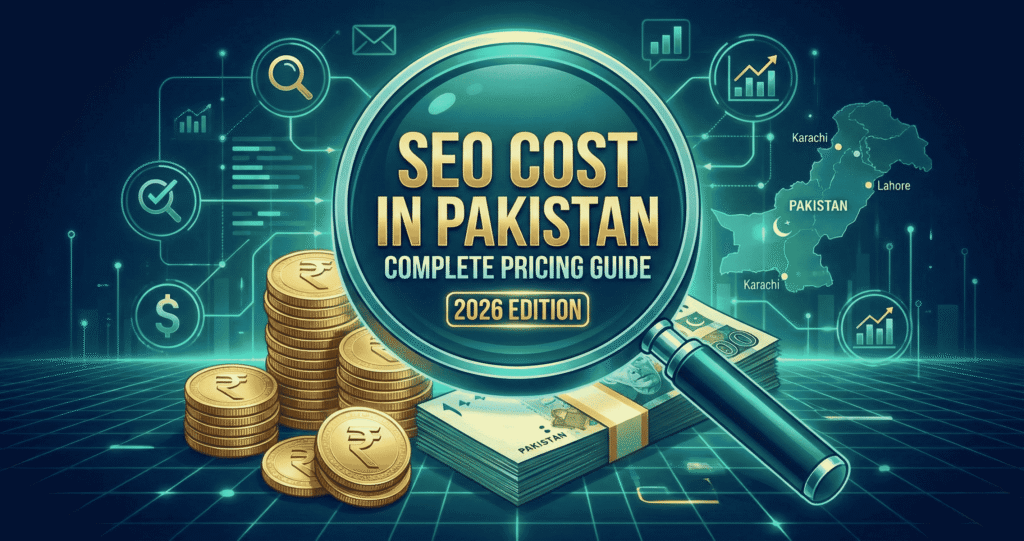At first glance, On-Page SEO vs Off-Page SEO sounds like a simple comparison. What you do on your website versus what happens outside of it.
But the difference between On-Page and Off-Page SEO is much deeper than that.
On-Page SEO is everything you control within your website. Your content, structure, keywords, meta tags, internal links, and user experience.
It’s how you tell Google, “This is what my page is about, and here’s why it deserves attention.”
On the other hand, Off-Page SEO is the trust-building game. It’s what happens beyond your site. It includes backlinks, brand mentions, and signals from other websites that vouch for your credibility.
It’s how the internet says, “This brand is worth ranking.”
Both are essential gears of Google’s ranking machine. One strengthens your site, the other builds its reputation.
But here’s where most marketers miss: mastering one without the other can actually hold your rankings back.
Curious how? Let’s break it down.
What Is On-Page SEO?
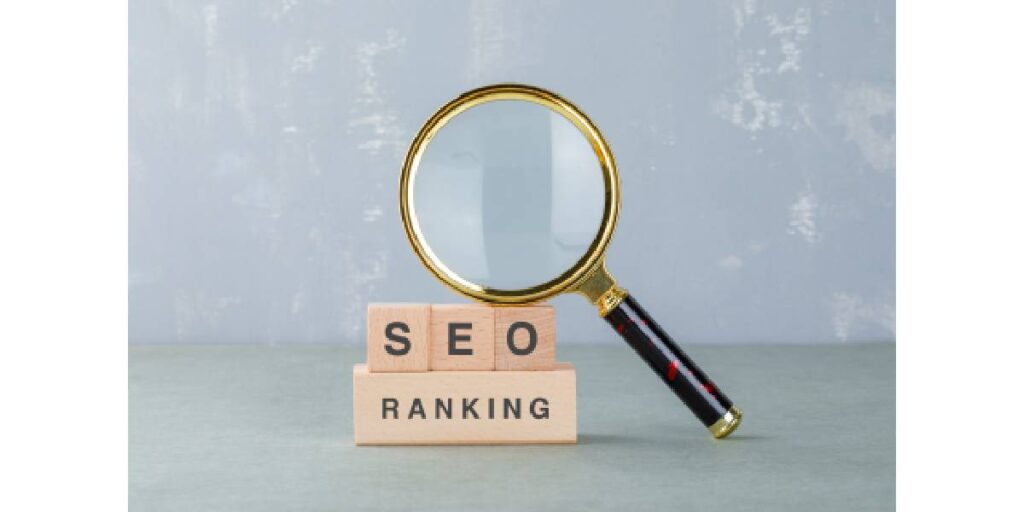
On-Page SEO is the process of optimizing every element within your own website to improve how both users and search engines experience it. From your content and headings to image alt tags and internal links. Everything on your page plays a role in how Google understands and ranks it.
Effective On-Page SEO techniques include:
- Writing high-quality
- Keyword-rich content
- Optimizing meta titles and descriptions
- Using header tags properly
- Ensuring your URLs are clean and descriptive
Technical factors like site speed, mobile responsiveness, and Core Web Vitals also influence how well your pages perform.
On a deeper level, Google’s crawlers scan your HTML code, read schema markup, and analyze structured data to determine what your page is about and whether it deserves a top ranking.
Strong On-Page optimization is the foundation of all On-Page and Off-Page SEO strategies. It helps search engines understand your website, and users trust it.
What Is Off-Page SEO? (Quick Breakdown)
Off-Page SEO is about all the activities that happen outside your website but still influence your search rankings. It’s about building your site’s authority, trust, and reputation across the web.
Key Off-Page SEO strategies include earning quality backlinks from reputable websites, gaining brand mentions, encouraging social shares, and collaborating with influencers or industry partners. These signals tell Google that others vouch for your content, making your site appear more credible.
Google evaluates several factors, like:
- Domain Authority (DA)
- Domain Rating (DR)
- Anchor text diversity
- Link velocity (how quickly or naturally you gain links)
These metrics help measure how strong and trustworthy your backlink profile is.
So, the bottom line is:
Off-Page SEO proves your website deserves to rank higher. And when balanced well, it amplifies the difference between On-Page and Off-Page SEO. One focuses on your website’s quality, the other validates its credibility.
On-Page vs Off-Page SEO: Key Differences at a Glance
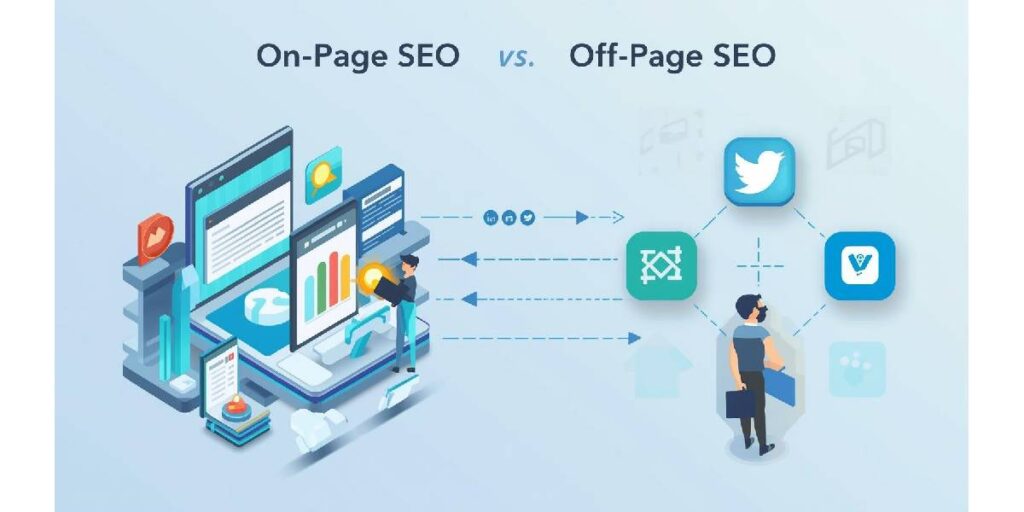
Here’s how On-Page and Off-Page SEO differ across the most important ranking factors.
This On-Page SEO vs Off-Page SEO comparison to help you understand where your focus should be for better rankings and visibility.
| Factor | On-Page SEO | Off-Page SEO |
| Focus | Site optimization | Authority building |
| Control | Full control | External influence |
| Core Activities | Content, structure, UX | Backlinks, outreach, PR |
| Tools | Yoast, Screaming Frog | Ahrefs, Semrush, BuzzSumo |
| Impact Speed | Gradual | Variable (depends on links) |
| Risk | Low | Higher if spammy links |
| Maintenance | Regular updates | Ongoing relationship building |
Mastering both On-Page and Off-Page SEO factors ensures your website not only looks good to search engines but also earns the trust and recognition it needs to rank higher.
On-Page SEO vs Off-Page SEO: Key Differences in Detail
Both are parts of one system. One shapes how your site performs from the inside, the other builds its strength from the outside. Together, they decide how high you appear on Google’s search results.
Let’s break down the key differences between On-Page and Off-Page SEO, factor by factor.
1- Content Quality & Relevance
High-quality, relevant content is the foundation of On-Page SEO and the fuel for Off-Page SEO.
On-Page SEO side, the focus is on what’s on your website. Your words, structure, and clarity. Google reads your pages through HTML tags, like:
- <title> Title
- <h1>, <h2>, <h3>, <h4> Heading levels
- <p> Paragraph
- And more
To understand what your content is about.
When you use clear headings, logical keyword placement, and internal links between related pages, you help Google connect topics together. This improves relevance and topical authority.
Creating content that’s keyword-optimized and valuable to readers is the foundation of On-Page SEO. If you want to know how this process works step-by-step, our complete guide about SEO Basics will help you knowing how search engines evaluate content depth, keyword intent, and relevance.
But the story doesn’t end there.
Quality content naturally earns mentions, backlinks, and shares from other websites, which is where Off-Page SEO kicks in.
When multiple trustworthy sites link to your content, Google treats it as proof that your page deserves visibility. It’s like your content being “voted” as valuable across the web.
On-Page SEO creates great content; Off-Page SEO gets the world to recognize it.
2- Technical SEO & Crawlability
If search engines can’t crawl or understand your pages, your content won’t rank. No matter how good it is.
On-Page SEO side, technical SEO focuses on behind-the-scenes elements, like:
- Fast Load Speed
- Secure Https
- Clean Site Structure
- Mobile Responsiveness.
Google uses these signals to measure how well your website performs. Tools like Screaming Frog or Google Search Console help you fix crawl errors, broken links, or duplicate pages. The better your technical setup, the easier it is for Google bots to index your site.
Off-Page SEO side, links from other domains also influence crawlability. When your site earns backlinks from high-authority domains, Google’s crawlers revisit it more frequently, recognizing it as important. Even social shares can trigger faster indexing.
Together, On-Page SEO builds a clear path for crawlers, and Off-Page SEO gives them reasons to return.
3- Authority & Trust Signals
Google ranks websites it can trust. Authority and credibility are built over time, partly through your own content and partly through what others say about you.
In On-Page SEO, authority begins with content depth, expertise, and structure.
Adding author bios, factual references, and schema markup (like “Article” or “FAQ” schema) strengthens your E-E-A-T signals (Experience, Expertise, Authoritativeness, and Trustworthiness).
Our AEO vs SEO guide further explains how modern ranking systems prioritize content that demonstrates genuine expertise and authority.
On the other hand, on the Off-Page SEO side comes the validation from outside.
- Backlinks from trusted domains
- Digital PR mentions,
- Consistent NAP (Name, Address, Phone) citations across business listings
They all increase your domain authority (DA) and domain rating (DR).
Anchor text diversity (or the variety of words used to link back to you) also matters. However, over-optimized or spammy anchors can do more harm than good.
On-Page SEO builds your reputation’s core, while Off-Page SEO spreads that reputation across the internet.
4- User Engagement Metrics
Google doesn’t just look at who links to you. It watches how real users behave on your site.
Strong On-Page optimization keeps people engaged. Clear navigation, compelling headings, short paragraphs, and fast load times reduce bounce rate.
When users spend more time reading, scrolling, or clicking on internal links, Google sees your content as valuable. At the same time, higher click-through rates (CTR) from search results show that your title and description are relevant to user intent.
On the other hand, Off-Page SEO influences engagement indirectly. Brand mentions, influencer collaborations, and referral traffic from guest posts bring new audiences to your site.
Here’s a tip for you:
- Following an Omni-Channel SEO approach ensures those visitors experience consistency across all touchpoints, which increases engagement and repeat visits.
When these visitors search your brand name later, called “branded search volume.” It signals your trust and growing popularity.
Combined, these behaviors help Google understand that people not only find your site but also trust it, enjoy it, & find it valuable.
5- Sustainability & Growth Over Time
On-Page SEO builds a strong base. Off-Page SEO accelerates momentum.
On-Page SEO side, your efforts, like:
- Optimizing titles
- Improving content structure
- And updating pages
They all compound over time. Each improvement makes future optimization easier.
On the flipside, Off-Page factors such as backlinks and mentions take time to build but can rapidly scale your visibility once they start compounding.
For a better understanding of how this long-term investment translates into real-world results, check our SEO Pricing Guide for 2026.
However, they also need maintenance, removing toxic links, diversifying your link profile, and nurturing partnerships.
So, the bottom line is:
- Mastering On-Page SEO vs Off-Page SEO techniques means thinking long-term.
- You control what’s inside your website, but you also influence how the world reacts to it.
- The stronger your balance between both, the more stable and visible your online presence becomes.
When to Focus on On-Page SEO
On-Page SEO works best when you’re launching a new website or improving an existing one that lacks structure and clarity. It’s your first move toward better visibility, making sure every page speaks Google’s language before you go chasing backlinks.
This approach is ideal for:
- Blogs
- Local businesses
- SaaS platforms
- And startups are trying to grow organically without spending heavily on ads
When you optimize content, titles, and metadata correctly, search engines can understand what each page offers, and users can find what they’re looking for faster. That’s how relevance turns into rankings.
It also matters when you’re working on content optimization, improving internal linking, or adding schema markup for better indexing. Page speed, layout design, and user experience all play huge roles here.
Even the most advanced Off-Page campaigns can’t fix a poorly structured or slow-loading site.
If you’re a startup or small business, focusing on On-Page SEO for startups means investing in a foundation that scales. Clean structure, clear intent, and crawlable pages will always outperform shortcuts.
On-Page SEO is your foundation. Without it, no amount of backlinks through Off-Page SEO will help.
When to Focus on Off-Page SEO
Off-Page SEO works once your website is technically sound and your content is fully optimized.
That’s when it’s time to step outside your domain and let the world talk about you.
It’s the smart move for competitive niches, eCommerce stores, and already-established websites looking to grow their reach and authority. When your On-Page structure is set, Off-Page SEO strategies, like:
- Link outreach
- Guest posting
- And digital PR
They all start delivering real results.
Think of it as reputation building. Not just ranking.
Every high-quality backlink acts like a vote of confidence from another site. Every mention, citation, or collaboration strengthens your digital footprint.
In saturated markets, knowing when to use Off-Page SEO can mean the difference between being seen and staying buried. Once Google trusts your site technically and contextually, these external signals push your authority even further.
It’s also perfect for brands trying to position themselves as thought leaders. Regular mentions in industry blogs, podcasts, and news outlets help boost your brand search volume. A powerful Off-Page signal.
Off-Page SEO amplifies your reputation, but it needs a strong On-Page base to work.
How On-Page and Off-Page SEO Work Together
On-Page and Off-Page SEO work best when they run hand in hand.
You can optimize your content, meta tags, headings, and site structure all you want, but external signals like backlinks, brand mentions, and social shares multiply your authority.
This synergy is powerful:
High-quality content earns natural backlinks, and backlinks boost your content’s trustworthiness in Google’s eyes. Studies show that pages with strong On-Page and Off-Page SEO strategies can rank up to 3x higher than those with only one.
Here’s how to make them work together:
- Use internal links to strengthen pages that attract backlinks.
- Publish shareable, high-value content that naturally draws links.
- Track both On-Page and Off-Page metrics in tools like Ahrefs and Google Search Console.
- Coordinate content updates with outreach campaigns to maximize visibility.
When done right, On-Page builds the foundation, and Off-Page amplifies it.
It’s a loop:
> The Better Your Content
> The More Backlinks You Earn
> The Stronger Your Authority
> The Stronger Your Authority
> The Better Your Pages Rank
> Fueling More Traffic
Understanding how On-Page and Off-Page SEO work together transforms your SEO from a slow climb to a compounding growth engine.
Off-Page Mistakes vs On-Page SEO Mistakes
SEO can be tricky. Many businesses stumble not because the strategies fail, but because they apply them the wrong way.
Let’s break down the most common pitfalls and how to fix them.
1- Ignoring the Technical Setup Before Building Links
If your site has crawl errors, slow load speed, or messy URLs, even high-quality backlinks won’t help your rankings.
Here’s the right approach:
Fix technical issues first.
Use tools, like:
- Google Search Console
- Screaming Frog
- AISEO
- And more
To identify and resolve crawl errors, improve Core Web Vitals, and streamline site structure. Once your foundation is solid, link-building efforts become far more effective.
2- Over-Optimizing Keywords (On-Page SEO)
Stuffing keywords into content, meta tags, or headings can hurt your rankings and user experience.
Then, what’s right?
- Focus on natural keyword placement.
- Optimize content semantically, include LSI keywords, and prioritize readability.
- Use headers, internal links, and schema markup strategically to help search engines understand your content without overwhelming readers.
3- Buying Spammy Backlinks (Off-Page SEO)
Not all links are good links. Low-quality or paid links from irrelevant sites can trigger penalties.
Here’s the solution:
- Prioritize high-authority, relevant backlinks.
- Earn links through guest posts, digital PR, influencer mentions, and authentic brand collaborations.
- Monitor your link profile regularly to remove toxic links and maintain trustworthiness.
4- Neglecting UX or Thin Content
Fast-loading pages, clear navigation, and valuable content matter just as much as links and keywords. Thin or low-quality content reduces engagement and trust.
Then, what’s right?
- Invest in quality content that satisfies user intent.
- Improve page design, headings, internal linking, and mobile responsiveness.
- Focus on dwell time, CTR, and engagement metrics
They directly signal to Google the value of your site.
5. Ignoring Mobile Optimization
With more users browsing on smartphones, a site that isn’t mobile‑friendly can lose traffic and rankings. Slow loading pages, unresponsive design, or poor navigation frustrate users and search engines alike.
Businesses that ignore mobile optimization suffer with their websites taking more than 3 seconds to load. As a result, they lose 53% of potential mobile users.
Here’s the solution:
- Ensure responsive design across all devices.
- Optimize images, fonts, and buttons for mobile screens.
- Test your site’s insights regularly with tools like PageSpeed, GTmetrix.
A seamless mobile experience improves user engagement, reduces bounce rate, and strengthens both On‑Page and Off‑Page SEO performance.
Frequently Asked Questions
Understanding how On-Page and Off-Page SEO work together is key to ranking success. Here are the most commonly asked questions, answered in simple, practical terms to help you optimize your site effectively.
Which is more important, On-Page SEO or Off-Page SEO?
Both are important, but their roles differ. On-Page SEO ensures your website is technically sound, user-friendly, and content-optimized. Off-Page SEO builds authority through backlinks and external validation. Ignoring either can limit your rankings; a balanced strategy delivers the best results.
Can On-Page SEO work without Off-Page SEO?
On-Page SEO alone can improve crawlability, user experience (UX), and content relevance, helping you rank modestly. But without Off-Page SEO, your site lacks authority signals, limiting its ability to compete in competitive niches. Both must work together for strong, sustainable rankings.
How can I balance On-Page and Off-Page SEO efforts?
Start with a solid On-Page foundation: optimized content, headers, meta tags, and schema. Simultaneously, build quality backlinks, brand mentions, and PR coverage. Monitor performance in Google Search Console and analytics tools, adjusting efforts based on which strategy drives more traffic and conversions.
How do On-Page and Off-Page SEO improve Google rankings?
On-Page SEO signals relevance through well-structured, informative content and technical optimization. Off-Page SEO signals authority via backlinks, citations, and social mentions. Google combines these signals to assess your site’s trustworthiness, topical depth, and overall value to users.
How long does it take to see results from both?
On-Page SEO tweaks can start showing improvements within 60–90 days, but full optimization may take 4 to 6 months to rank in Google searches. Off-Page SEO, including backlinks and authority building, compounds over time. Most websites see significant organic growth and ROI within the first year.
What is the role of backlinks in Off-Page SEO vs On-Page SEO content?
Backlinks are critical Off-Page SEO signals that show Google your site is trusted by others. On-Page SEO focuses on content quality and internal linking, which supports authority but doesn’t replace external validation. Both together maximize search visibility.
Best practices for On-Page and Off-Page SEO in 2026
Update content regularly, optimize meta tags, headings, and schema for On-Page SEO. Focus on high-authority, relevant backlinks, PR mentions, and social signals for Off-Page SEO. Measure performance continuously and adapt strategies to Google’s evolving algorithm updates.
Let’s Wrap Up
On-Page SEO gives you control. Off-Page SEO builds credibility.
Both are essential gears in the ranking machine.
Neglect one, and your SEO engine won’t perform at full power.
For strong, lasting rankings, you need a balanced On-Page and Off-Page SEO strategy.
Optimize your site internally and simultaneously build authority externally. That’s how Google rewards sustainable growth.
Need help finding the right balance?
At Cloudex Marketing, we cut through the noise.
No fake promises. No fancy reports without real work.
We focus on honest, transparent strategies that get measurable results.
We build a unified On-Page SEO & Off-Page SEO strategy tailored to your goals.
Your website deserves a strategy that works today and scales tomorrow.



